Lethal Minds Journal Special Edition: Celebrating Women's History Month
Special Edition: Celebrating Women's History Month 23MAR2025
A Note from the Managing Editor -
Stories are important. I’ve said this countless times. They take us away to some far away land, show us glimpses into worlds we never knew existed, reveal truths, teach. They drive us, motivate us, destroy us. Save us. Stories remind us to dream and hope, imagine. They tell us who we are and show us who we could be. The women below are chapters of the growing story of women in the military. Bookmark them. Highlight your favorite parts. Write reminders. And most importantly, share them. Share these voices that often go unheard. Talk about them. Let their words ignite inspiration.
It wasn’t written in the stars or foretold in prophecy. She fought her way. Forged a path her own. Burned it Right into the ground. They told her she couldn’t go. Told her she wasn’t strong enough, Wasn’t loud enough, Wasn’t brave enough. They told her she wasn’t enough. She stared down the doubt and smiled, “Watch me.” Send your story to lethalmindsjournal.submissions@gmail.com Jillian Bosserdet Managing Editor - Lethal Minds Journal
Dedicated to those who serve, those who have served, and those who paid the final price for their country.
Guerrera Documentary Interview
“Guerrera brings to light the untold stories of extraordinary women - those who served in the U.S military’s Cultural Support Team (CST) and Afghan Female Tactical Platoon (FTP) who were embedded with Special Operations in Afghanistan, and the Afghan women who continue to fight for freedom against overwhelming odds.”
Will Agee is the award-winning Director and Producer of Guerrera and founder of California-based Dulcinea Productions. We sat down to ask him about the film.
Who are you, what is the documentary, and why? Where did this concept come from?
My name is Will Agee, I am a documentary filmmaker from Napa Valley, CA. I have always been drawn to stories of unsung heroes and the human capacity to rise above all obstacles. I believe that the role of documentary filmmaker is very unique in the creative space. Of course we need to entertain the audience, but we also must do so with integrity. I have always believed that our primary role is that of translator: doing our best to capture, interpret, and share stories that are not our own lived experiences. For me, it is important to ensure that documentaries are both accurate and elegant, which is at times a difficult balancing act to pull off. I have frequently found that there can be a tension between authenticity and cinematic quality, but there is a great deal of satisfaction in navigating this fine line. It is an honor to be entrusted with the responsibility to share these stories, one that I approach with immense reverence and resolute determination.
Guerrera is a three part limited docuseries that lifts the veil on the opaque world of Special Operations and reveals the remarkable true story of the trailblazing cadre of women who served at the tip of the spear in America’s longest war - its involvement in Afghanistan. From outside the wire in-country, to on the homefront, this revealing documentary series paints an intimate portrait of elite war fighters and the battles they fought and are still fighting.
The concept for this documentary came out of the blue. Over the past 10 years, I have had the fortune — sometimes misfortune — to make films all over the world in some very challenging environments. In January 2020, I was poised to travel to five different continents on another adventurous documentary undertaking and then COVID hit. During the subsequent lockdown, that project and many others were cancelled. Like many of us at that time, I would be on Zoom calls with friends, family, and colleagues trying to make sense of what the future might hold. Providentially, my girlfriend's cousin, who was a member of the US Army Cultural Support Team (CST), reached out and floated an idea for a short documentary capturing the stories of that Team as well as honoring the memory of their fallen comrades. I was immediately on board. As a civilian, I had never heard of the Cultural Support Team and quite frankly, my knowledge of Special Operations, and in particular the role of women in those units, was scant at best. However, I have had a love of military history for as long as I can remember, and I was instantly drawn to learn more about the CST. It became immediately apparent that these were stories of historic proportions, stories I believe that the country profoundly needed to hear and see at that moment. I believe that is still true, 5 years later.What was the outcome you envisioned once this documentary hit the scene?
My hope was and is that the audience will feel a deep connection with the people portrayed in this documentary, and maybe even see glimpses of themselves in each one. I have always liked to create an intimate atmosphere between the audience and the individuals on screen so that it feels like they are in the same room together. On a personal note, getting to know these incredible people over the past several years has been one of the most rewarding experiences of my life. I consider many of them my dear friends, some approaching the closeness of family, and their approach to life has had an extraordinary impact on me. I have learned so much about the War in Afghanistan, Special Operations, and what it means to be a warrior at the most elite level. However, the most lasting lessons I learned are in how to manage life, with all of its challenges, ups and downs. I hope that anyone who watches this series will feel a similar connection, and find a similar benefit from their wisdom.Did it have the impact you hoped for?
The impact has been incredible! In the few short weeks since release, the people featured in the series and I have received an overwhelming amount of comments, posts, and texts from all over. It is really resonating with veterans of the GWOT. Frequently, they’ll emphasize how accurate it is from their perspective as those who lived it. But perhaps the most surprising thing is the amazing feedback we have received from those who are unaffiliated with the military and had no idea about this story. It has opened a lot of eyes and seems to be serving as a deep source of inspiration for people of all ages. Our goal is to continue to ensure that Guerrera comes up on the radar of anyone who hasn’t had the opportunity to see it yet. We live at a time where the entertainment options are limitless, but these stories really resonate for a broad range of people and I am certain that the momentum is just beginning.Did you run into any challenges or resistance during production?
Making documentaries, especially those that deal with sensitive topics, always presents a ton of challenges. Probably the most difficult obstacle to overcome was the limited amount of footage filmed contemporaneously on location and as the events were unfolding. The very nature of Special Operations direct action missions makes it prohibitively difficult to source a great deal of such content. Luckily, the characters and our team would always find a way — the SOF community is famously resourceful when it comes to solving problems. When all was said and done, we were provided a trove of footage, of course all unclassified, that provides an intimate glimpse into what being an elite war fighter feels like.As the stories of these women unfolded, did anything redirect your vision or plan?
Without a doubt the disastrous withdrawal from Afghanistan springs to mind. We were heading towards the conclusion of principal photography in August 2021 when all hell broke loose. Our intrepid cinematographer, Jordan Bryon, was scheduled to fly from Kabul to Kandahar the very day that Kandahar fell to the Taliban. Courageously and without missing a beat, he travelled there a few days later and captured some of the most incredible footage that I have ever seen in the midst of complete chaos. I find it hard to argue that the withdrawal was anything short of a catastrophe and it completely changed our approach to episode three and initiated yet another year of filming. The status quo that we all had believed would be maintained at the start of production was now completely out the window. Understandably, there was no shortage of disillusionment and anger from the people portrayed in the documentary, who sacrificed so much. But as with military operations in general, as in life itself, nothing ever goes completely according to plan. It was our job to make the best sense of things we could with events as they actually unfolded.The women seemed to want to share their story, to encourage other women (and men) out there that women belong in these spaces. Men I’ve spoken with seem pretty adamant that women do not, was it difficult to find men to speak on their experiences with the CSTs?
One thing that I believe most people can agree upon, not just in the military but also in society at large, is that everyone should have an equal opportunity but that the most qualified individual for the task at hand should get the job. Character and competency over superficial characteristics. Surprisingly to some, it wasn’t difficult at all to find men from 75th Ranger Regiment all the way to Special Mission Units to speak about their first hand experiences and impressions. It became clear that there were, and there remain, a great deal of vital tactical and operational functions within Special Operations which qualified women can and do perform magnificently. There are many concerns and stigmas that are confronted in the series and discussed by the men and women who lived these events. I have always found the opinions of those who were there and performed these missions to be the ones that hold the most weight. One thing that stood out to me, and I think the documentary shows this, was the universal desire from all of the men and women in the series that standards be tailored to one thing only: the success of the particular mission. There was consensus among these professional warriors that these standards should be equally applied and gender agnostic. I found that refreshing and a great way to clarify a starting point for any meaningful discussion. Guerrera is meant to open dialogue rather than end it and I hope that everyone will watch the series and that it will provide a launching point for informed and thoughtful conversations going forward.The documentary seems to be about more than just women in the special operations space. It seemed the commentary was driven by the notion that maybe we should all start seeing each other as human beings again. The short poem from Luke Ryan stood out to me: “The angriest people I have ever met have never fought in their lives.” Likewise, Tom Block wrote: “America is the team” and Habiba Aslami - Webb said: “That’s your opinion, this is my opinion. That’s why it’s America.” Have you received any backlash about this documentary - from the military and/or civilian community, or has the feedback been positive?
That old adage which goes something like, “if you’re not taking any fire, you’re not on the target” is quite accurate. However, the small amount of “backlash” that has presented itself has come invariably from those who haven’t actually watched the series and seem to have a preconceived notion as to what it is. In many ways, I can’t blame them. For so many years documentaries that deal with important topics like this have been weaponized to push a certain viewpoint and silence perceived opposition. This inevitably results in distrust and rejection. I have often likened the climate to trench warfare, both sides trying to annihilate each other without affording any time or space to better understand the actual reason for their disagreement, or even to determine if there really is a disagreement. I believe that there has been a concerted effort to discourage us from coming out into “no man's land” to meet and converse. But it is precisely that simple act of meeting together, to speak and converse, to learn to see other perspectives, to exchange ideas, that is most needed right now. Guerrera is much more than a story about the role of women in Special Operations during the War in Afghanistan. It is a thought-provoking exploration of what it means to be a warrior, an American, and a human being. There are, I think, a lot of moments in the series that go a long way in helping reinforce the bonds that unite us.Was there anything surprising to you as the documentary came together? Did you have any opinions that changed? What was your experience learning about these women and their stories?
I was blessed with a mother who was a trailblazer in the business world and with a father, exceptional in his own right, who cherished her completely. I believe that this beautiful dynamic shaped the way that I view the world. I have always had a profound respect for women and I have such deep admiration for the people whose stories are told in Guerrera. Getting to know these courageous women was deeply inspiring to me, and they are genuine role models for future generations of America’s daughters. They are warriors in every sense of the word. There were so many things that surprised me and so many lessons learned during the course of making Guerrera that if I went through them all, we’d be here all day and I’d probably bore the hell out of your readers. But in all seriousness, the goal with every documentary that I make is to try to bring the audience along the same journey that I experienced. Now that isn’t to suggest that I hope that everyone ends up with the same conclusions — quite the opposite. To take a journey with someone is not to share everything that person thinks and believes; but it is a way to share a vantage point on a set of experiences. All great stories are those of transformation. We all begin somewhere; and through the course of the adventure we end up seeing the world and ourselves differently. Hopefully, we are the better for it and we can pass along the wisdom that we have gained.How has the documentary been received by the public? Have there been any memorable or significant moments that stand out to you?
I probably already covered this earlier, but I just received a text from a character in Guerrera who got a text from a friend and fellow veteran. It reads, “I watched all three episodes on Prime. Couldn’t stop watching. This is the most real, authentic, and accurate show covering anything about GWOT that I’ve seen. Very well done. 10/10.” It’s these kinds of notes that mean the absolute world to an outsider like me who was welcomed into this community.Was there anything looking back you would have changed or added?
One of the greatest challenges in my line of work is deciding when a project is finished. There’s that haunting quote attributed to Leonardo da Vinci, “Art is never finished, only abandoned.” It’s especially poignant considering the tragic state of affairs in Afghanistan and how that all came to pass. Additionally, there are many challenges our GWOT veterans are facing right now, and I know that there are so many untold stories whose telling could help. One’s work is simply never enough. However, all that being said, I do believe that everyone in front of and behind the camera is immensely proud of Guerrera and the window that it provides into a time and place that was so very important in the history of our nation and the world.I first became aware of women involved with special operations through a Virginia Hall biography and then with the story of Shannon Kent. And that’s about where the stories stopped for me. Recently, I spoke with a female friend, who’s pursuing a path within special warfare in the Air Force, about the lack of stories about women in these roles. Little girls don’t grow up seeing these paths as something they could pursue.. I believe in the power of stories, really that’s all we have. Do you intend on continuing to tell the stories of these women who have worked in the shadows or what’s next for you?
Shannon Kent was an incredible warrior and an inspiration to so many of us, I haven’t yet read that particular biography but it’s now made my ever growing list of books that I need to purchase. I have the deepest respect for your friend who is pursuing her path and I genuinely wish her the best of luck in her chosen field. The stories of women like those in Guerrera should serve as an important reminder that anything is possible with determination. These stories are being written in real time, and I hope that, looking ahead, there will be so many more available to young women who are seeking affirmation and encouragement on this path. Jessica Yahn, who brought the initial documentary idea to me, runs a nonprofit called AllTru. This organization is the official charitable impact partner for Guerrera and is carrying the mission forward. She is working tirelessly to empower young women in this space and I hope that your friend and others engage with the community that AllTru is building.
As for me, I will always love and support the men and women of Special Operations. They welcomed me and entrusted me with their stories and it is an honor that I will never forget. We currently have several other documentaries in various stages of post-production and one of them in particular does pick up after the withdrawal of Afghanistan. I encourage anyone interested to please follow us @dulcineaproductions on Instagram to learn more about our upcoming projects. I couldn’t be more excited to share them with the world!What have I not asked that I should have?
Nothing that I can think of! These were excellent questions and I sincerely thank you for your curiosity and efforts to amplify Guerrera. I look forward to your followers taking the time to watch this series which is available on Amazon Prime Video, Apple TV, YouTube and the Google Play Store. I genuinely want to hear their thoughts!
Artwork Honoring Women in the Military
Lani Hankins
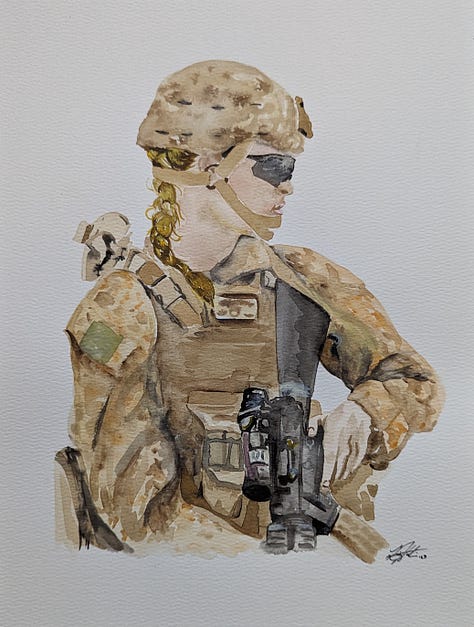
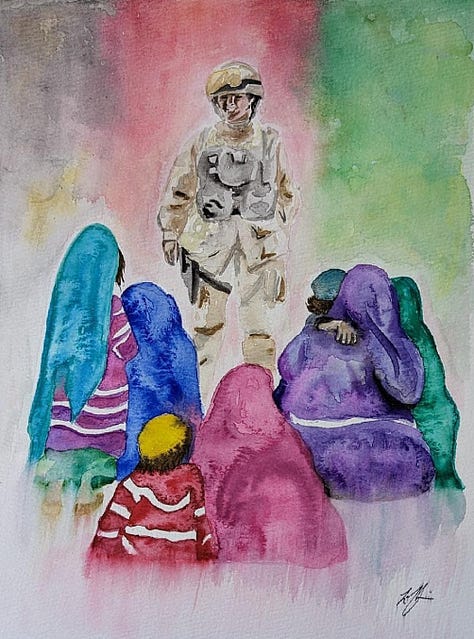
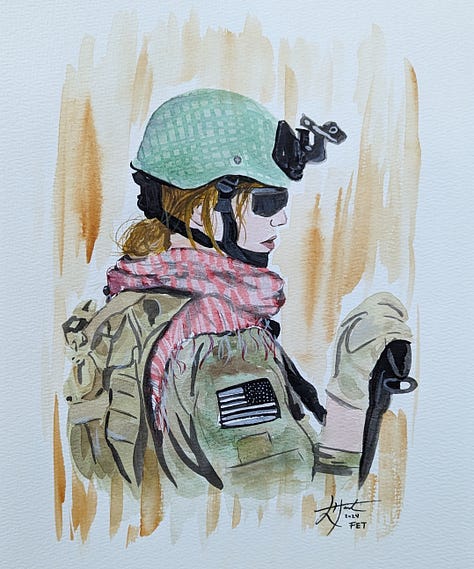
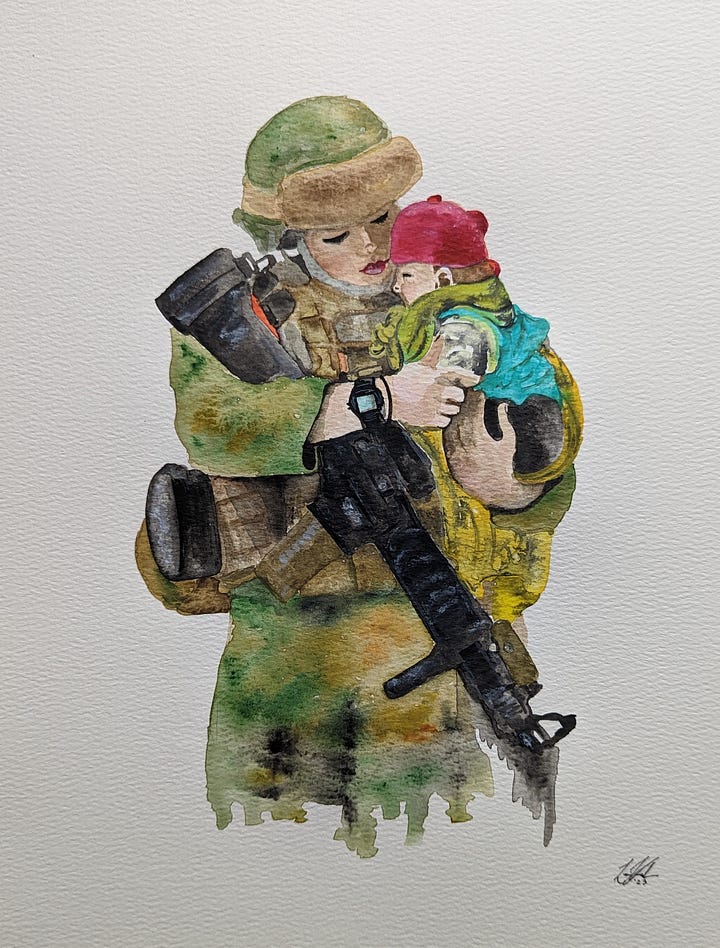
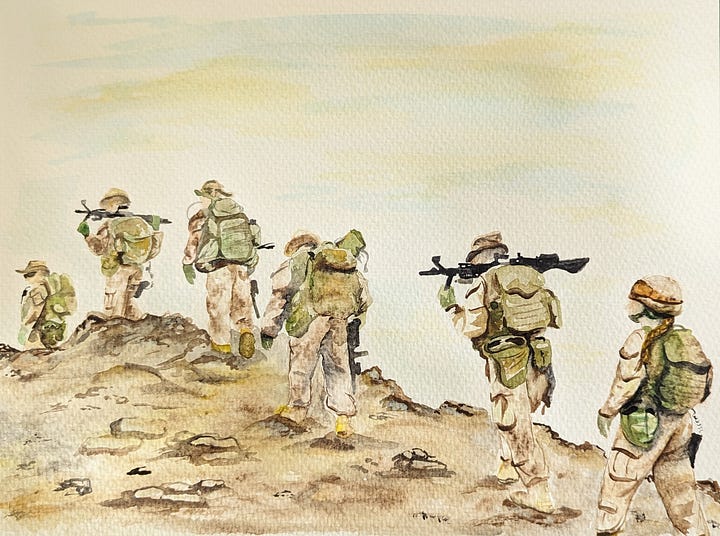
Lani Hankins is an artist living in the Flint Hills of Kansas who uses art to share personal stories addressing everything from hardship to heartache, falling in love to falling apart and pushing forward in times of hopelessness. She has been creating art for nearly 30 years and has been inspired by surrealist painters, growing up near the ocean, her military service, and life on the prairie. Lani prefers to explore dark themes, taboo topics, and uncomfortable imagery, using creativity to reflect, heal, and bring awareness to things like violence, mental health, and veteran suicide.
@lm_hankins_art
My Dead Friend Zoe - Movie Review
Kelli Ahlquist
My immediate reaction in the first 5 minutes of this film and seeing two Army soldiers jamming out to music while on deployment, I knew this would be a good watch. Not only does it star actors Sonequa Martin-Green, Natalie Morales, and Morgan Freeman, but most of the cast is either veterans or family to a veteran. It truly is a story of veterans, made by veterans and cast with veterans.
The storyline follows an Army wheel mechanic veteran named Merit and her (dead) best friend, Zoe. Zoe was a fellow mechanic, and the two were the best friends that only those in the military could truly understand. She ends up going to help her grandfather Dale, who, living alone in his cabin, is progressively experiencing memory loss. Dale, a veteran from Vietnam, and Merit, an Afghanistan veteran, have a unique connection with each other through their service, as Merit joined the Army inspired by her grandpa. Merit struggles to connect with those around her and is unable to open up about her time in service because she feels doing so could mean losing her friend forever. The movie’s progression is revealed through Merit, the audience only learns her story as she begins feeling able to reveal it.
This movie shows it all: the generational difference in veterans’ experiences after returning from war, all the ‘shooting the shit’ talks on deployment between two soldiers and their future, the grief and regret from losing friends, those times cleaning latrines on deployments, the loneliness for some after getting out, and the glimmer of hope human connection provides.
This movie is not about a battle at an outpost overseas but the battle after. It has the perfect amount of dark humor to help with the processing of grief, regret, and loss. It has one sole message: talk it out. Talking about what happened, whatever it was, can help break through the pain.
Don’t Let The Monsters Out - Book Interview
1. Who are you, and what have you written?
I'm Heather O'Brien, writer, dog mom, daughter, big sister, and an aunt to three awesome little humans. I'm originally from a tiny little town in north country New York, but I grew up mostly outside of Fort Leonard Wood, Missouri. I was in the Air Force from May 2002 until March 2009. As a security forces airman and then NCO, I've been stationed at Kadena Air Base, Okinawa; Minot Air Force Base, North Dakota; and Little Rock Air Force Base, Arkansas. I've done everything from flightline security to nukes to law enforcement. I deployed to Shahbaz Air Base in Pakistan from Sept 2003 to May 2004 and to Camp Bucca, Iraq from January 2007 to October 2007.
Don't Let the Monsters Out was born out of my last deployment. Working in a Theater Internment Facility is unlike anything I ever imagined I would do. I always assumed that Security Forces deployments would be mostly flightline or base security and possibly a few cool off base patrols; detainee operations were a completely foreign concept.
2. What drew you to writing? Why write this book?
I kind of accidentally fell into writing. I'd been decent at writing essays for high school and college but really hadn't thought of continuing once I graduated. This book began as part of a therapy tool suggested by my therapist. Every time I would try to explain my deployment, I would get caught up having to explain all the ins and outs of the prison that by the time I would talk about the hard experience, I was already seething. I couldn't finish a simple story without wanting to scream or throw things. So, she suggested writing things down as they came to me. I worked nights at the time, so I would type things down when there wasn't any work coming in. One day, I looked at the amount and realized this was almost a book's worth of experiences.
Don't Let the Monsters Out needed to be written because I couldn't find any book I could point to and say, "That's what my deployment was like." I couldn't find anything remotely about Camp Bucca other than its continuous “honorable mention” as the birthplace of ISIS - which happened during part of my time there; but isn’t something I wanted or needed to remember. Thousands of soldiers, sailors, and airmen spent time there, and while each deployment was different, it seemed to me that we needed someone to start talking about Camp Bucca. Not because it was glamorous, awesome, or heroic, but specifically because it was none of those things. The book does not portray me as the hero embarking on a journey of becoming a better person. To the contrary, as time in that deployment went on, I became a horrible person. I came to believe that stories of those who served there need to be told, the full truth of them, not to make us look cool but because the brutal truth is the war is still killing us, even years after we come home.
3. Your book reads like you're listening to a friend recount their story in person. It's very honest and raw. Tell us about the process you undertook to write this book?
I started writing just little pieces that I could remember. Simple riots or escapes one night, maybe some stories of flight members on other nights. I would write until I started to get swallowed by the experience, and then I would stop. I had been recently released from a VA psych ward stay and was going through some intensive therapy, so my brain couldn't handle too much stress. It was slow going at first.
As time went on, I asked my buddies about some of the things they remembered, to make sure I wrote these events correctly. I relied heavily on my military friends while writing, not just for accountability but also to remember some of the lighter times we had over there. They were my rock in continuing to write. Some of them had never told their families what they did over there. Many did amazing things and are too modest or ashamed to tell their families. I've tried to highlight some of their incredible stories as well.
4. What did you learn in the process, and what surprised you?
I don't think I had ever realized how much my deployment had changed my character. I knew I was different than before and that I struggled with adjusting back to the United States, but I didn't really notice that, in many ways, the core of who I was had changed. The decisions I made in Bucca, good and bad, had started to reshape my value system and identity. For a long time, I just thought I was broken and unfixable.
One thing that really surprised me was that I could write a book. I had never really considered myself to be a writer, not like a “real” one. But as the book began to take shape, I realized that while it was hard, I really liked writing. Instead of this being the only book I would ever write, it became the first.
5. Would you do it again?
I'm assuming this question is regarding writing the book; however, whenever I hear it asked, I automatically think of doing my deployment again. And the answer is yes to both. For as much bad that happened during the deployment, the people I served with more than make up for it. I've made life-long connections, and I would go back to Camp Bucca over and over if it meant I got to be with them again. I would also write the book again because it's a story that needs to be told, not only for me but for the many others who still haven't found a way to talk to their friends and family. If my book is a medium for that conversation, then it's a success.
6. This is the first book I've read that explains what life was like guarding a prison. Most people can imagine the horrors experienced, the stress, and the trauma involved, but that's just it - it's imagination in combination with, most likely, a comparison to prisons here stateside. Those of us removed from the lived experience can try to imagine and then let go. You gave the reader more to hold on to than just imagination. Your words colored in and gave detail to a world of which most people only see an o. Were you inspired by anyone to share your account?
A good friend and I used to talk about how impossible it was to explain Camp Bucca. We would joke with each other about how we could try and box up the smell and send it home or record the riots; one time, she said, "Unless people could smell or taste the grossness of this place, they will never be able to understand it." My dilemma was this: to get a full experience of a place, one must have a full tactile immersion; yet my tools as a writer are, by definition, words. I really pushed my writing trying to give a sensory explanation of Camp Bucca - so that the reader is able to see it and even to smell and touch it, to have something like that sense of immersion.
7. What do you want people to take away from this book?
War is a multi-faceted monster. Just because a person wasn't kicking down doors or sniping doesn't mean they are not dramatically changed by what they experienced. People experience trauma differently. My father is an Afghanistan veteran, and we deal with different things. No deployment is the same for everyone. If you're a veteran who struggles with coming home and seeing who you have become, you don't have to stay that way. Even if the monster came out, it doesn't have to stay out.
8. You mentioned in a disclaimer, "I recognize that some of my actions in this book might raise questions about my mental health. Since the writing of this book, I have addressed these issues." Putting your soul out there for others to observe is incredibly brave - especially when you decide to publish your book with this disclaimer. What advice do you have for people who believe they have a story to share but fear what might come out?
In full honesty, the disclaimer was my editor's idea; she thought it might be helpful for readers to understand in advance what they were getting into. Initially, I balked, but I eventually realized it's quite helpful since some people just are not ready to read a book like this. I thought writing the book would be the hardest part, but seeing the published version go live was terrifying. I felt utterly exposed and alone. But then people began saying it helped them understand their veteran family members. I had a person tell me he read it and then gave a copy to his ex-wife so she would understand why he wasn't ok when he came back from Camp Bucca. He said he had never been able to explain to her how worried he was that he was too broken for her, so he just walked away from the marriage. It's still unnerving to have people talk about the book, and of course not everyone likes it, but the book is helping some people, and that's more than enough for me.
Write your book. Just let what needs to come out come out; not all of it has to be in the final draft, but just letting it come out of you will be healing. If you're really worried about what you're writing, maybe ask a battle buddy to read it and give you some feedback. But don't let fear stop you from telling your story and writing your book.
9. Looking back on your book, was there anything you wished you had included but didn't or couldn't at the time?
I would have gone more into my 2014 mental breakdown. At the time, I was just learning how to manage my emotions and juggling a cocktail of medications; diving deep into what led up to it and letting other people read about it was just too much. I've lost two friends to suicide, and just last year, I almost lost another one. I recognize that's too many to shy away from talking about the mental cost. The more I began to open up, the more I found that I wasn't alone, even amongst friends. I had no idea how many of my buddies and old troops had battled suicidal thoughts and actions, but as I talk about my experience, I'm starting to hear theirs. I would have liked to add a bit more of that journey, but at the time, it was just too fresh.
10. What is your favorite book and why?
Harry Potter and the Deathly Hallows. I realize it's not a deep book per se, but J.K. Rowling sets up a great battle scene. Ironically, I read this for the first time while at Camp Bucca; that's when it came out (in 2007). I love how Rowling didn't flinch in killing both good and bad guys; that's reality, in war, both sides lose people. I can't stand it when a book prepares you for a climactic battle, and suddenly all the good guys come out unscathed. The truth is battles and wars change you; even if the good side wins, it's not a great, cost-free celebration. I think too often we Americans glorify the supposed splendor of war without considering the heartache and death that must occur for any side to win. Rowling shows that depth in the deaths of Harry's friends. While most people remember the death of Dobby, for me, it was the deaths of Lavender Brown and Colin Creevy that stuck out the most. People who at one time were more of a bother to Harry than a help stayed beside him even though it cost them everything. The book also seemed to summon the end of my childhood and a turning point in my adult life. All the books were finished, and I was in my twenties, reading the last one in a war zone. It always seemed funny that I read the Battle of Hogwarts in a pod with one ear listening for riots or rockets.
11. We're celebrating Women's Month at LMJ. What advice would you give to women who want to join the military? Advice for women who are active duty or veterans who struggle with their own monsters?
Joining the military is probably the most impactful thing I've done; it helped shape who I am today. That's a good and a bad thing. If you're wishing to join the military, remember that someday it will end. Unlike a regular job, the military will stay with you forever; it will shape you, but don't let it become the only high point of your life. Take advantage of all the travel, training, and education it offers, but remember you have family and friends outside of it too.
Female veterans, don't be afraid to share your stories. You have a unique perspective on war that the civilian population won't hear about unless we speak up. When I finally began to talk about my monsters, they finally began to quiet down. You're more resilient than you know; don't let the monsters stop you from healing.
12. What have I not asked that I should have?
How long did this take? From start to publication, it took about 6 years to complete. It wasn't an easy one-and-done kind of writing. There were starts, stops, “I quit”s, and at one point, I lost all the edits on the manuscript. I thought it would never be done and started to give up many times, but something kept driving me to finish it.
———————
This ends Special Edition: Celebrating Women’s History Month (23MAR2025)
Special thanks to the volunteers and team that made this journal possible:




